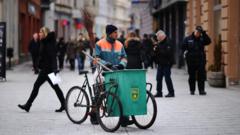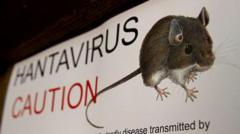In Sarajevo, the infamous Year of the Rat has returned, bringing with it a myriad of health challenges for residents of Bosnia and Herzegovina’s capital. Social media is awash with images of rats swimming in the Miljacka River, alongside neglected public spaces littered with overflowing rubbish containers and illegal garbage dumps. This unsightly environment is exacerbated by local authorities' failure to remove dead animals from areas frequented by children, thus creating a breeding ground for rodents.
Health professionals warn that inadequate control of the rat population has led to a spike in rat-related illnesses. In a single day, Sarajevo's largest hospital recorded twelve new cases of leptospirosis, following an earlier string of infections. Commonly referred to as "rat fever," leptospirosis spreads to humans through water or soil contaminated with rodent wastes, leading to a range of symptoms from headaches to severe lung issues. The acute form of this illness can cause jaundice and kidney failure, potentially resulting in death without treatment.
In response to this growing public health threat, local authorities have declared an epidemic, enabling the implementation of emergency measures aimed at cleaning the city. Municipal workers equipped with disinfectants have been dispatched across public spaces, and schools have been instructed to tidy playgrounds and inspect areas for rat infestations. This urgent action starkly contrasts the previous two years, during which no pest control measures were taken, a situation attributed to a failed tender process for sanitation work.
Sarajevo Canton Health Minister Enis Hasanovic emphasized the situation as a community rather than a health crisis stemming from repeated failures in municipal hygiene. Concern continues to mount among public health advocates, including Sebija Izetbegović, a former director of the Sarajevo's University Clinical Centre, now serving in the Sarajevo Canton Assembly. She warns that the flourishing rat population might also lead to hantavirus outbreaks.
So far, the leptospirosis cases reported have not escalated into severe health crises. Yet, the situation remains precarious, as untreated leptospirosis holds a grim mortality rate exceeding 50% for those who suffer severe symptoms. For now, Sarajevo is left to navigate this rat-infested dilemma, hoping that swift action will mitigate the risks and restore public confidence in their community's health.
Health professionals warn that inadequate control of the rat population has led to a spike in rat-related illnesses. In a single day, Sarajevo's largest hospital recorded twelve new cases of leptospirosis, following an earlier string of infections. Commonly referred to as "rat fever," leptospirosis spreads to humans through water or soil contaminated with rodent wastes, leading to a range of symptoms from headaches to severe lung issues. The acute form of this illness can cause jaundice and kidney failure, potentially resulting in death without treatment.
In response to this growing public health threat, local authorities have declared an epidemic, enabling the implementation of emergency measures aimed at cleaning the city. Municipal workers equipped with disinfectants have been dispatched across public spaces, and schools have been instructed to tidy playgrounds and inspect areas for rat infestations. This urgent action starkly contrasts the previous two years, during which no pest control measures were taken, a situation attributed to a failed tender process for sanitation work.
Sarajevo Canton Health Minister Enis Hasanovic emphasized the situation as a community rather than a health crisis stemming from repeated failures in municipal hygiene. Concern continues to mount among public health advocates, including Sebija Izetbegović, a former director of the Sarajevo's University Clinical Centre, now serving in the Sarajevo Canton Assembly. She warns that the flourishing rat population might also lead to hantavirus outbreaks.
So far, the leptospirosis cases reported have not escalated into severe health crises. Yet, the situation remains precarious, as untreated leptospirosis holds a grim mortality rate exceeding 50% for those who suffer severe symptoms. For now, Sarajevo is left to navigate this rat-infested dilemma, hoping that swift action will mitigate the risks and restore public confidence in their community's health.
















